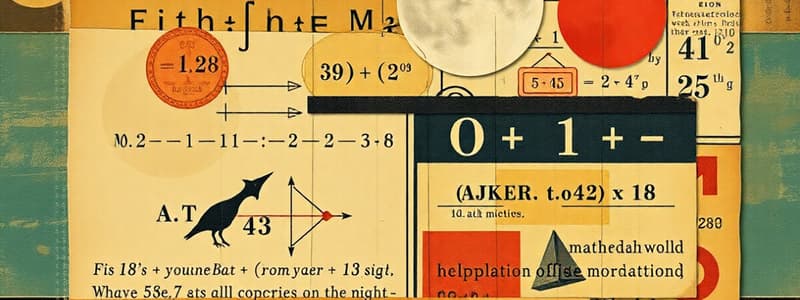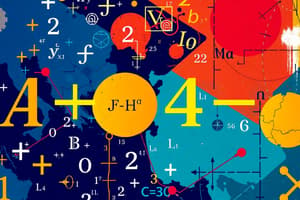Podcast
Questions and Answers
Which of the following operations is NOT a basic arithmetic operation?
Which of the following operations is NOT a basic arithmetic operation?
- Subtraction
- Exponentiation (correct)
- Multiplication
- Addition
What is the primary purpose of algebra?
What is the primary purpose of algebra?
- To introduce variables and equations (correct)
- To compute rates of change
- To find areas and volumes of solids
- To study shapes and their properties
Which branch of mathematics is primarily concerned with the study of shapes and their properties?
Which branch of mathematics is primarily concerned with the study of shapes and their properties?
- Number Theory
- Algebra
- Geometry (correct)
- Calculus
In calculus, what does differential calculus primarily deal with?
In calculus, what does differential calculus primarily deal with?
What area of mathematics focuses on properties of numbers, including primes and divisibility rules?
What area of mathematics focuses on properties of numbers, including primes and divisibility rules?
Which of the following applies to both arithmetic sequences and series?
Which of the following applies to both arithmetic sequences and series?
What is the primary focus of discrete mathematics?
What is the primary focus of discrete mathematics?
Which mathematical property ensures that the order of addition does not affect the sum?
Which mathematical property ensures that the order of addition does not affect the sum?
Flashcards
Mathematics
Mathematics
A formal system using logic and abstract thought to understand and quantify the world.
Arithmetic
Arithmetic
Deals with basic number operations: addition, subtraction, multiplication, and division.
Algebra
Algebra
Expands arithmetic using variables and equations to represent unknowns and relationships.
Geometry
Geometry
Signup and view all the flashcards
Calculus
Calculus
Signup and view all the flashcards
Number Theory
Number Theory
Signup and view all the flashcards
Discrete Mathematics
Discrete Mathematics
Signup and view all the flashcards
Variable
Variable
Signup and view all the flashcards
Study Notes
Fundamental Concepts
- Mathematics is a formal system of logic and abstract thought used to understand and quantify the world around us.
- It involves the study of numbers, quantities, shapes, and structures.
- Core branches include arithmetic, algebra, geometry, calculus, and more specialized fields.
- Mathematical concepts are used in various disciplines, including science, engineering, economics, and computer science.
Arithmetic
- Arithmetic deals with basic operations on numbers.
- These include addition, subtraction, multiplication, and division.
- Understanding number systems (e.g., decimal, binary) is fundamental.
- Properties of numbers (e.g., commutativity, associativity, distributivity) are crucial for efficient calculations.
- Arithmetic sequences and series involve patterns in numerical progression.
Algebra
- Algebra expands arithmetic by introducing variables and equations.
- Variables represent unknown quantities.
- Equations express relationships between variables and constants.
- Solving equations is a key skill.
- Techniques for manipulating equations, factoring polynomials, and simplifying expressions.
- Linear equations, quadratic equations, and more complex algebraic structures are studied.
Geometry
- Geometry focuses on shapes and their properties.
- Plane geometry deals with two-dimensional shapes (lines, angles, triangles, polygons).
- Solid geometry examines three-dimensional shapes (cubes, spheres, cones, and cylinders).
- Concepts like area, perimeter, volume, and angles are crucial components.
- Geometric theorems and postulates provide a framework for understanding spatial relationships.
Calculus
- Calculus is a branch of mathematics focusing on change.
- Differential calculus deals with rates of change (derivatives).
- Integral calculus deals with accumulation of quantities (integrals).
- Applications of calculus include finding slopes of curves, areas under curves, optimization problems, and motion analysis.
Number Theory
- Number theory focuses on the properties of numbers.
- This includes prime numbers, divisibility rules, modular arithmetic, and more advanced concepts.
- Understanding the distribution of primes is a significant area of study.
- Number theory has practical applications in cryptography and computer science.
Discrete Mathematics
- Discrete mathematics concerns mathematical structures that are discrete (not continuous).
- This includes logic, set theory, counting techniques, graph theory, and combinatorics.
- These tools are essential in computer science.
Statistics
- Statistics deals with the collection, analysis, interpretation, and presentation of data.
- Descriptive statistics involves summarizing and representing data.
- Inferential statistics uses samples to draw conclusions about populations.
- Probability plays a vital role in statistical reasoning.
- Probability distributions model the likelihood of different outcomes.
- Statistical techniques are employed across diverse disciplines.
Studying That Suits You
Use AI to generate personalized quizzes and flashcards to suit your learning preferences.





